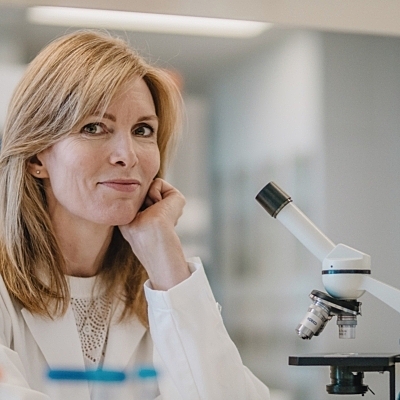Heather McCann
Manager, Sydney Brain Bank

Current Appointments
Director Sydney Brain BankDr Claire Shepherd is the Director of the Sydney Brain Bank at Neuroscience Research Australia. She trained in neuroscience and completed her PhD in Alzheimers disease at the University of Sheffield, UK. After completing her PhD she relocated to Sydney to pursue her interest in the neuropathology of dementia. Soon after her move, Claire was awarded the prestigious Rolf Edgar Lake Fellowship from the University of Sydney and subsequently directed a National Health and Medical Research Council (NHMRC) project grant as CIA. In 2000 Claire was awarded the inaugural Franz Nissl Young Investigator Prize in Neuroscience in recognition of achievements in her early post-doctoral years. She now runs the Sydney Brain Bank, which is a research facility that collects, characterises and stores brain tissue for research into neurodegenerative disease. Claire is also the Director of the Shepherd Dementia Research Laboratory at NeuRA and lead investigator on the NeuRA Volunteers Brain Donor Program a longitudinal research program aimed at investigating the clinical consequences of the cellular changes that occur during ageing. In October 2019, Claire received funding from the Brain Foundation for a new research program that will investigate the presence of chronic traumatic encephalopathy (CTE) in the brain tissue of a large population of well-characterised individuals held by the Sydney Brain Bank and determine any association with repetitive traumatic brain injury exposure. On 27 November, the National Rugby League (NRL) announced support of a Newcastle University-based research program for former players. The participants in this program will be invited to donate their brains to the Sydney Brain Bank after death to facilitate medical research. This is part of Claire's newest research into how sports-related brain changes impact on a players quality of life.
2026, 07 Feb
Region-specific variations in the cerebrovasculature underlie disease progression in Parkinson's disease
View full journal-article on https://doi.org/10.1093/brain/awaf305
2025, 03 Dec
Nucleolar aggregation of key neuropathological proteins in the postmortem neurodegenerative brain
View full journal-article on https://doi.org/10.1007/s00401-025-02968-2
2025, 01 Dec
The LRRK2 p.L1795F variant causes Parkinson’s disease in the European population
View full journal-article on https://app.dimensions.ai/details/publication/pub.1186940480
2025, 19 Nov
Accelerating biomedical discoveries in brain health through transformative neuropathology of aging and neurodegeneration
View full journal-article on https://app.dimensions.ai/details/publication/pub.1190941527
2025, 10 Nov
Chronic Traumatic Encephalopathy Neuropathologic Change in Military Veterans
View full journal-article on https://doi.org/10.1093/milmed/usaf553
2025, 11 Aug
Characterisation of putative retrotrapezoid nucleus (RTN) chemoreceptor neurons in the adult human brainstem
View full journal-article on https://doi.org/10.1007/s00429-025-02991-9
2025, 01 Jun
Evidence of COMT dysfunction in the olfactory bulb in Parkinson’s disease
View full journal-article on https://app.dimensions.ai/details/publication/pub.1186104285
2025, 05 May
Characterisation of putative retrotrapezoid nucleus (RTN) chemoreceptor neurons in the adult human brainstem
View full preprint on https://doi.org/10.1101/2025.04.30.650987
2025, 01 May
Bacteria in the brain: do they have a role in the pathogenesis of Alzheimer’s disease?
View full journal-article on https://app.dimensions.ai/details/publication/pub.1186003892
2025, 25 Apr
Multi-region brain transcriptomic analysis of amyotrophic lateral sclerosis reveals widespread RNA alterations and substantial cerebellum involvement
View full journal-article on https://doi.org/10.1186/s13024-025-00820-5
Every dollar of community support enables our scientists to continue making life-changing discoveries that contribute to a brighter and healthier future.
Run, swim or bake your way to making a positive difference in the lives of people touched by brain and nervous system disorders.
Stay informed about our latest research breakthroughs, scientific discoveries and the incredible minds behind them – subscribe today.
Neuroscience Research Australia respectfully acknowledges the Bidjigal and Gadigal peoples of the Eora Nation as the Traditional Owners of the Land on which we stand and pay our respects to Elders past and present.
Redevelopment of the NeuRA website has been made possible by the generous support of Conexus Financial.